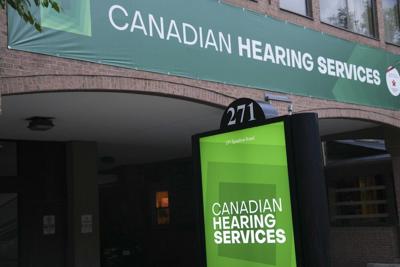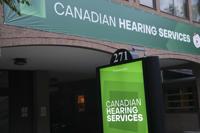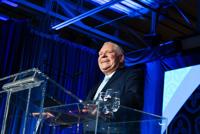In early June, Jessica Sergeant waited five and a half hours for a sign language interpreter to arrive at her Ottawa hospital room while she had a cardiac emergency.
Sergeant, who is Deaf, said the long wait amid a strike by ´şÉ«Ö±˛Ą Hearing Services workers in Ontario was "traumatic."
"I didn't know what was going on with my heart. I didn't know at all what was happening," she said through an interpreter in a recent interview.
Sergeant said she was about to get into the ambulance when she texted the ´şÉ«Ö±˛Ą Hearing Services' Ontario provider to request an in-person American Sign Language interpreter.Â
"And they said, 'Have the hospital call us,'" Sergeant recalled.
She said there was no confirmation that an interpreter was coming by the time she got to the hospital, so she had to ask again by typing it out on her phone to show the hospital staff.
"It's my body, my health, my heart at stake," she said. "Why is that power in the hands of the hospital or the organization providing the interpreter?"
Finally, an interpreter showed up. But when Sergeant returned to the hospital 10 days later, she was told there were no interpreters available because of the strike.Â
More than 200 unionized ´şÉ«Ö±˛Ą Hearing Services employees — including interpreters, audiologists and counsellors — walked off the job on April 28, leaving deaf and hard-of-hearing clients without critical services for more than two months.Â
The employees are set to return to work on July 14 after voting this week to ratify a new three-year contract that includes pension, benefits and wage increases, said their union, CUPE 2073.
But Sergeant and others who rely on ´şÉ«Ö±˛Ą Hearing Services say the strike has illuminated operational issues at the non-profit, and the need for broader change within the organization.
"Trust is gone from the community," said Sergeant.Â
She said timely access to an interpreter was a problem even before the strike.Â
"The issue fundamentally is my rights as an individual," said Sergeant. "When I ask for a sign language interpreter, why isn't that respected and arranged accordingly, immediately?"Â
During Sergeant's medical emergency last month, the hearing services provider shouldn't have required the hospital to verify the need for an interpreter after Sergeant had already requested one, said Leah Riddell, president of the Ontario Cultural Society of the Deaf.
"There is a roster of interpreters, freelance interpreters, different organizations they could have contacted to provide an interpreter, but they made a fundamental decision that impacted Jessica's health," Riddell said through an interpreter.Â
"They have a monopoly over all of us and all the services they provide, which puts us at a standstill."
Riddell said the organization doesn't reflect the community it serves, which also affects service quality.Â
"Their perspective is, 'We’re going to do this for the Deaf community, but not with the Deaf community,' and that kind of attitudinal barrier causes more harm to the Deaf community," said Riddell.
Although ´şÉ«Ö±˛Ą Hearing Services says on its website that the "majority" of its board of directors is Deaf or hard of hearing, only two members identify as such in their bios.Â
The organization did not respond to questions about its board and leadership diversity, but said in a statement that it continued offering interpreting services during the strike to clients who needed them for urgent matters such as hospital visits.Â
"While we cannot discuss specific details about an individual client's service as that information is confidential, we can confirm that we have 100 per cent supported priority clients in all our programs and services offered during the labour dispute," CHS said.Â
Khaleelah McKnight, who has a 10-year-old Deaf son and has also turned to CHS to learn American Sign Language, said the strike was "really disruptive" for her child's medical appointments.
"It's a really big stress on me as a parent to have to interpret and be mom in an appointment and it also doesn't allow him to learn how to advocate for himself and to communicate," she said.
The last time CHS workers walked off the job was for 10 weeks in 2017 — something McKnight said she remembers well. She said the two strikes have left her with little confidence in the leadership of the organization.
"It's a marginalized community, and in your structure, you seem to have marginalized the very people you're serving," she said, adding that she recognizes the strike's impact on workers, many of whom are also Deaf or hard of hearing and have meaningful relationships with their clients.Â
"The workers are burnt out, they have their own issues and concerns," Riddell said. "But at the same time, (CHS) promises to do better and they have not."
Judith Greaves, a senior from Ottawa who has received interpretation services and mental health counselling from CHS over the past couple of decades, said that as some of those services become more internet-based and technology-reliant, they are actually less accessible for people like her. She relies on satellite internet and said accessing interpreting services over applications such as Zoom can be tricky.
"In the last 10 years it's gone downhill a bit, where upper management has drawn a line where they can only go so far to help you," she said.
"We need CHS staff to get back to work and do their jobs and we also need CHS to be more Deaf friendly and do a little bit more for us."
This report by ´şÉ«Ö±˛Ąwas first published July 10, 2025.







































